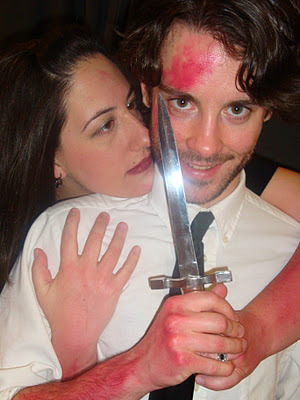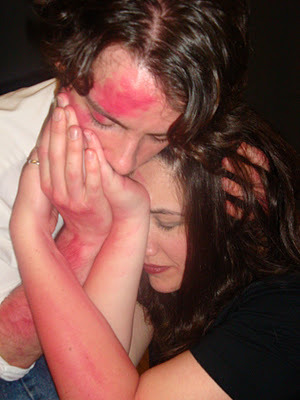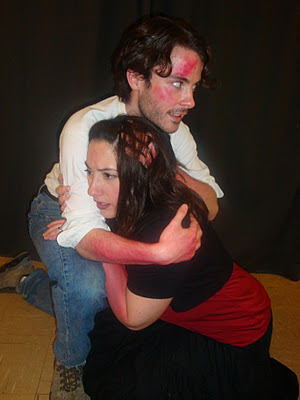Emily C.A. Snyder's Blog, page 9
February 7, 2012
A History of Words
In the beginning...
I've been writing ever since I can remember. My mother even wrote down poems that I created (on the highly original topics of "Red" "Blue" and "Colors") before I could write
Red Red is a color
Blazy and bright
Red is feeling strong
With all your might
Fire-cracker
Fire-flicker
Fire-engine
Red
And when you get angry
Red is in your head(Actually, I like "Red" which either goes to show that there was a spark of something there at four years old, or that my sensibilities have not improved by thirty-four. You can see the poem, right.)
Curiously, though, I was a late reader. From nursery school through second grade, I was in the slowest of all the reading groups - the sort that read See Jack Run when the other kids were reading War and Peace (or so it felt). I remember in Kindergarten, other students were reading and so, to fit in, one day I grabbed Dr. Seuss' Hop on Pop which was a staple at the Snyder household, and which I had memorized down to the page-turn. I announced that I would read it (aka perform it) out loud, which I did perfectly to nobody's interest...and besides which, I wasn't reading it at all.
Then, in second grade, while I was supposed to be working on a math problem (I remember I was something like the fourth row back from the teacher, second row in from the wall, near the end of the alphabet which hung suspended from the front door to the back door of the classroom), I overheard the story that the "smart group" was reading. It was a fairy tale, along the lines of Cinderella meets the three fairy godmothers from Disney's Sleeping Beauty by way of the Norns, and it included a picture. Now, I've always loved fairy tales and being denied the reading of one because I was in the See Jack Run group was tantamount to a crime. I ditched math, snuck the reading textbook onto my desk, found the fairy tale and zipped through it.
I became a reading fiend.
When I got my superpower...
In third grade, I was suddenly bumped up to a fourth grade reading level. There were a few of us in a separate group, and we had not only our own table but a considerable number of privileges. Our teacher, Mrs. Rombanus, was an awesomely crazy, red-haired, Ramona-Quimby-esque woman, who firmly believed not only in being outside of the box, but also scribbling on it. I asked her if, instead of our usual morning writing prompt of "What I did over summer vacation" I could write whatever I felt like.
Sure, she said.
Could I write serialized fiction, a chapter a day?
Sure, she said.
Could I write poetry?
Sure, she said.
In the library, I began reading everything there was to read about dinosaurs - and became an expert. (I wasn't.) I found this book by this guy named Shakespeare, whose name sounded familiar and combined with some arcane honour, and read Romeo and Juliet because I had heard of it. (More on this later.) I read A Secret Garden and then proceeded to attempt to write my daily fiction entirely in dialect. That came back with a ton of red correction marks because I'd faithfully dropped all my h's and ending g's from -ing's as well as writing words as phonetically as possible. I was frustrated with Mrs. Rombanus for not realizing good dialect when she read it...but then noticed that she hadn't corrected any of my made-up proper nouns.
"Ah-ha!" thought I. "If I make up the name of something...she can't correct it."
I began to write fantasy.
One of the projects that the super-duper league of third-grade readers were asked to do was to go down to the mentally challenged students (they weren't integrated into classrooms, then) and read to them books for about half an hour. This was all very well, but after a day or two of this, I suggested to my classmates that it would be far superior (and less drool-y...I'm afraid my first day I'd been placed with a perfectly lovely fellow human being who, while I dutifully read Clifford, fell asleep on my shoulder and cheerfully wetted it) if we acted out the stories.
My fellow SDLTGRers were amenable to the idea, and I began organizing us as we would walk through the school to the classroom. We never rehearsed before and we were all on book (and frankly, I feel as though I ended up taking most or at least the largest of the parts) but we'd (I'd?) enthusiastically assemble our audience and put on story-plays that were the envy of any one of Shakespeare's rude mechanicals .
Unfortunately, after about five performances, the SDLTGR players were told to stop and go back to being drooled on, because the special needs students were, "Becoming over-excited," which - to this day - bothers me as an excuse. Because, honestly, isn't that the point of theatre and reading and school? But the teachers wanted a soporific...and so our services were no longer required.
The importance of daydreaming...
In fourth grade, I was put into the gifted program - which was essentially that one day a week a few of us from grades 4-8 would be pulled out of whatever our class was doing and allowed to pursue whatever we were interested in for about an hour. It was homeschooling without the home. I remember there was an eighth grader who was doing statistics - which mostly seemed to be about throwing dice around and making poster boards. Our teacher, as it were, would occasionally call us all together to give us brain teasers along the lines of "The person with the strawberry has a blue shirt and is third in line from the person with a red shirt so who has the banana?" I was only moderately good at them.
What I was good at was entertaining myself. At our first meeting to meet each other and learn about the class and decide what we wanted to focus on, I announced that since I Knew Everything About Dinosaurs (having made that comprehensive study of looking at the pictures in the books in our small library), and since my maternal Grandmother had just given me my first journal with radishes on it, I Would Write Poetry.
My thought was that since Statistics Girl had a clear goal of throwing as many dice as possible in each session, I ought to write at least three to four poems per class as well. However, I found that inspiration was considerably more elusive than statistics. One day, sitting in the middle of the library, at a table by myself while several feet before me closer to the windows Statistics Girl was going great guns on her poster, I was surprised by the teacher coming up behind me and asking how I was doing.
Startled out of my reverie, I confessed that I had been daydreaming. "That's wonderful," my teacher told me. "That's what a poet is supposed to do."
At that moment, I decided that I had better be a writer.
Because I really like to daydream.
What a novel idea!...
Writing helped keep me sane during our move from New Hampshire to New Jersey in the middle of fourth grade. Reading Shakespeare's Romeo and Juliet (in the original - it turned out I'd gotten a "modernized" version in third grade - mumble grumble) gave me confidence.
In seventh grade, Ken Burns' The Civil War documentary aired, concurrent with having just read the unabridged Gone with the Wind, both of which inspired me so much that I went out and Learned Everything About the Civil War (I didn't), and started a truly atrocious novel about spies and southern belles in the Civil War...which was mostly about myself (as the heroine) and my current crush (as the Yankee spy) with our own names.... Needless to say, that book will not only remain deep beneath the bed, but deep within the trash bin.
It was important, though, because it was my first stab at a novel. I never finished it, although I wrote maybe a hundred pages, because in freshman year I began writing a retelling of The Pied Piper of Hamlin which by the second paragraph had become Elspeth . This project took up much of my brain through my first year out of college, at which point I was caught up with Austenesque frenzy...and a dead-end day job. (One of the best motivations to write, I think, is a cubicle.) I wrote Presumption , Nachtsturm Castle and the basis for Letters of Love & Deception .
I also began having success with publication at this time. In 2002-2003 I wrote and published Niamh and the Hermit , followed soon after by Charming the Moon ....
And then I fell off the map.
What happened? Theatre.
Where have all the novelists gone?...
As has been well-documented, in 2009 Margaret C. Sullivan and Laura MacDonald from Girlebooks.com both pulled me back into the fiction-writing world with Nachtsturm Castle. The Austenesque community graciously pulled me in last June with the Austenesque Extravaganza . And last June, I began a grand experiment to see if I could "give more attention to this writing thing" than I had been.
But it's tough. And my hat's off to those women who are mothers, which is a more than full-time job, who also write. Or to those authors who hold down full-time jobs, who also write. Or to anyone, frankly, who finds the time to write. My hat's off to those folk who are good at social networking, at maintaining blogs and all the details that go into running a successful on-line community, to twitterers and facebookers, promoters and independent publishers, to all those self-driven folk who are social despite a solitary craft. I'm trying to keep up with you Jonses...but I'm having a tough time.
One of the reasons I haven't given "more attention to this writing thing" is because of my "theatre thing." Something that's got me fully sewn up from now to August. (And hopefully, beyond. I haven't yet slated in my post-August season, but I need to get on that by March at the latest!)
As readers of this blog will no doubt have noticed, there have been long stints of non-writing in my life. In point of fact, what I learnt simultaneously and which came to fruition in college, was that what I like even better than daydreaming alone is daydreaming with others: that is, the act of solitary creation in writing is less exciting to me than the act of collaborative creation in theatre. Or, perhaps I should say, the act of collaborative creation is far more urgent than solitary creation. A show date come hurtling at me, with all the decisions and indecisions, problems and perfections of any work of art...only there's no putting off the deadline. And, as a director, there are a ton of choices to make - and everyone needs you to make them yesterday. I'm not complaining (although I'm pretty close to putting up two shows, so maybe there's a little facedesking in there). But I am explaining.
For me to write fiction, I find I have to be in the proper headspace: it has to be the right time of day, I need to be awake, a large cup of tea is helpful, earbuds, the proper musical playlist (I'll play one song on repeat if necessary to keep myself in a certain emotional landscape) - and then even once in that space, it takes a while for my soul to really rest there, to clear itself and let the juices flow. If they flow.
The show must go on!...
As opposed to theatre where if I don't show up, ain't nobody doing theatre that day. Hence, I've gone to dress tech the day before show with a stomach flu, having just thrown up half an hour before, because I was the sole vocalist and the show was half song and it was the day before show and the show must go on.
I broke my arm on the first day of Romeo and Juliet rehearsal, was dragged out of rehearsal and to the hospital by the efforts of my mother, my sister, and my three stage managers (I didn't want to go, despite the fact that wrists don't usually look like that), but left my sister and my three stage managers in charge. I returned to rehearsal the next day and the next several weeks drugged down with pain killers that - if I were home - knocked me out almost immediately, but were no match for the rush of adrenaline I got as soon as my feet hit the rehearsal space. What's even more impressive is that, despite being one-armed and drugged up for most of the rehearsal process, that's one of the shows that I feel I directed the best.
I spent one year pulling almost nothing but double rehearsals (two rehearsals in one day with just enough time to travel, and not always enough time to eat or prep for the second rehearsal), while holding down a full-time teaching job. Fortunately, my father and sister were in the second show, so I'd get myself home, type up my blocking notes (which looked like war plans because it was choreography for The Pirates of Penzance), crawl into the family car, and fall asleep for the twenty minutes it took to get from here to there and be early. My feet would hit the floor of the rehearsal room and I had better be good to go, because there were seventy people staring at me for direction.
There's no time to get into the right headspace for theatre. Or, there is, but it's a matter of never quite leaving that headspace. Even now, as I type this, my brain is full of Macbeth and some casting questions we still have (any young men near Concord want to be in a show?), and how awesome the final fight is, and how I have to do up the props list, and write e-mails, and revise the schedule, and a thousand other things for tonight.
And I'm still partially in The Light Princess world which goes up in two weeks (six more rehearsals), and which is starting to come together as a show, and which is still not fully costumed yet, and which still has forms which need to come back for when we take it on tour, and which helium balloon floated away yesterday for one of our tricks and so I'm thinking we'll scrap the helium balloon and just use a regular old one which might be easier anyway.
And a weeeeeeee little part of me is thinking about Occupy Walmart which goes up post-Macbeth, and whatever we'll be doing for the Sophomore competitive play (also post-Macbeth), and Midsummer Night's Dream which begins post-Sophomore competitive play.
Phew!...
So, I'm still writing Strangeways, I'm still revising Presumption, and I'm still here. I'm just also in Scotland, and Faery, and Walmart, and Athens, and wherever the Sophomore Class votes on going. It'll be an adventure, and I'll meet you on the other side!
I've been writing ever since I can remember. My mother even wrote down poems that I created (on the highly original topics of "Red" "Blue" and "Colors") before I could write
Red Red is a color
Blazy and bright
Red is feeling strong
With all your might
Fire-cracker
Fire-flicker
Fire-engine
Red
And when you get angry
Red is in your head(Actually, I like "Red" which either goes to show that there was a spark of something there at four years old, or that my sensibilities have not improved by thirty-four. You can see the poem, right.)
Curiously, though, I was a late reader. From nursery school through second grade, I was in the slowest of all the reading groups - the sort that read See Jack Run when the other kids were reading War and Peace (or so it felt). I remember in Kindergarten, other students were reading and so, to fit in, one day I grabbed Dr. Seuss' Hop on Pop which was a staple at the Snyder household, and which I had memorized down to the page-turn. I announced that I would read it (aka perform it) out loud, which I did perfectly to nobody's interest...and besides which, I wasn't reading it at all.
Then, in second grade, while I was supposed to be working on a math problem (I remember I was something like the fourth row back from the teacher, second row in from the wall, near the end of the alphabet which hung suspended from the front door to the back door of the classroom), I overheard the story that the "smart group" was reading. It was a fairy tale, along the lines of Cinderella meets the three fairy godmothers from Disney's Sleeping Beauty by way of the Norns, and it included a picture. Now, I've always loved fairy tales and being denied the reading of one because I was in the See Jack Run group was tantamount to a crime. I ditched math, snuck the reading textbook onto my desk, found the fairy tale and zipped through it.
I became a reading fiend.
When I got my superpower...
In third grade, I was suddenly bumped up to a fourth grade reading level. There were a few of us in a separate group, and we had not only our own table but a considerable number of privileges. Our teacher, Mrs. Rombanus, was an awesomely crazy, red-haired, Ramona-Quimby-esque woman, who firmly believed not only in being outside of the box, but also scribbling on it. I asked her if, instead of our usual morning writing prompt of "What I did over summer vacation" I could write whatever I felt like.
Sure, she said.
Could I write serialized fiction, a chapter a day?
Sure, she said.
Could I write poetry?
Sure, she said.
In the library, I began reading everything there was to read about dinosaurs - and became an expert. (I wasn't.) I found this book by this guy named Shakespeare, whose name sounded familiar and combined with some arcane honour, and read Romeo and Juliet because I had heard of it. (More on this later.) I read A Secret Garden and then proceeded to attempt to write my daily fiction entirely in dialect. That came back with a ton of red correction marks because I'd faithfully dropped all my h's and ending g's from -ing's as well as writing words as phonetically as possible. I was frustrated with Mrs. Rombanus for not realizing good dialect when she read it...but then noticed that she hadn't corrected any of my made-up proper nouns.
"Ah-ha!" thought I. "If I make up the name of something...she can't correct it."
I began to write fantasy.
One of the projects that the super-duper league of third-grade readers were asked to do was to go down to the mentally challenged students (they weren't integrated into classrooms, then) and read to them books for about half an hour. This was all very well, but after a day or two of this, I suggested to my classmates that it would be far superior (and less drool-y...I'm afraid my first day I'd been placed with a perfectly lovely fellow human being who, while I dutifully read Clifford, fell asleep on my shoulder and cheerfully wetted it) if we acted out the stories.
My fellow SDLTGRers were amenable to the idea, and I began organizing us as we would walk through the school to the classroom. We never rehearsed before and we were all on book (and frankly, I feel as though I ended up taking most or at least the largest of the parts) but we'd (I'd?) enthusiastically assemble our audience and put on story-plays that were the envy of any one of Shakespeare's rude mechanicals .
Unfortunately, after about five performances, the SDLTGR players were told to stop and go back to being drooled on, because the special needs students were, "Becoming over-excited," which - to this day - bothers me as an excuse. Because, honestly, isn't that the point of theatre and reading and school? But the teachers wanted a soporific...and so our services were no longer required.
The importance of daydreaming...
In fourth grade, I was put into the gifted program - which was essentially that one day a week a few of us from grades 4-8 would be pulled out of whatever our class was doing and allowed to pursue whatever we were interested in for about an hour. It was homeschooling without the home. I remember there was an eighth grader who was doing statistics - which mostly seemed to be about throwing dice around and making poster boards. Our teacher, as it were, would occasionally call us all together to give us brain teasers along the lines of "The person with the strawberry has a blue shirt and is third in line from the person with a red shirt so who has the banana?" I was only moderately good at them.
What I was good at was entertaining myself. At our first meeting to meet each other and learn about the class and decide what we wanted to focus on, I announced that since I Knew Everything About Dinosaurs (having made that comprehensive study of looking at the pictures in the books in our small library), and since my maternal Grandmother had just given me my first journal with radishes on it, I Would Write Poetry.
My thought was that since Statistics Girl had a clear goal of throwing as many dice as possible in each session, I ought to write at least three to four poems per class as well. However, I found that inspiration was considerably more elusive than statistics. One day, sitting in the middle of the library, at a table by myself while several feet before me closer to the windows Statistics Girl was going great guns on her poster, I was surprised by the teacher coming up behind me and asking how I was doing.
Startled out of my reverie, I confessed that I had been daydreaming. "That's wonderful," my teacher told me. "That's what a poet is supposed to do."
At that moment, I decided that I had better be a writer.
Because I really like to daydream.
What a novel idea!...
Writing helped keep me sane during our move from New Hampshire to New Jersey in the middle of fourth grade. Reading Shakespeare's Romeo and Juliet (in the original - it turned out I'd gotten a "modernized" version in third grade - mumble grumble) gave me confidence.
In seventh grade, Ken Burns' The Civil War documentary aired, concurrent with having just read the unabridged Gone with the Wind, both of which inspired me so much that I went out and Learned Everything About the Civil War (I didn't), and started a truly atrocious novel about spies and southern belles in the Civil War...which was mostly about myself (as the heroine) and my current crush (as the Yankee spy) with our own names.... Needless to say, that book will not only remain deep beneath the bed, but deep within the trash bin.
It was important, though, because it was my first stab at a novel. I never finished it, although I wrote maybe a hundred pages, because in freshman year I began writing a retelling of The Pied Piper of Hamlin which by the second paragraph had become Elspeth . This project took up much of my brain through my first year out of college, at which point I was caught up with Austenesque frenzy...and a dead-end day job. (One of the best motivations to write, I think, is a cubicle.) I wrote Presumption , Nachtsturm Castle and the basis for Letters of Love & Deception .
I also began having success with publication at this time. In 2002-2003 I wrote and published Niamh and the Hermit , followed soon after by Charming the Moon ....
And then I fell off the map.
What happened? Theatre.
Where have all the novelists gone?...
As has been well-documented, in 2009 Margaret C. Sullivan and Laura MacDonald from Girlebooks.com both pulled me back into the fiction-writing world with Nachtsturm Castle. The Austenesque community graciously pulled me in last June with the Austenesque Extravaganza . And last June, I began a grand experiment to see if I could "give more attention to this writing thing" than I had been.
But it's tough. And my hat's off to those women who are mothers, which is a more than full-time job, who also write. Or to those authors who hold down full-time jobs, who also write. Or to anyone, frankly, who finds the time to write. My hat's off to those folk who are good at social networking, at maintaining blogs and all the details that go into running a successful on-line community, to twitterers and facebookers, promoters and independent publishers, to all those self-driven folk who are social despite a solitary craft. I'm trying to keep up with you Jonses...but I'm having a tough time.
One of the reasons I haven't given "more attention to this writing thing" is because of my "theatre thing." Something that's got me fully sewn up from now to August. (And hopefully, beyond. I haven't yet slated in my post-August season, but I need to get on that by March at the latest!)
As readers of this blog will no doubt have noticed, there have been long stints of non-writing in my life. In point of fact, what I learnt simultaneously and which came to fruition in college, was that what I like even better than daydreaming alone is daydreaming with others: that is, the act of solitary creation in writing is less exciting to me than the act of collaborative creation in theatre. Or, perhaps I should say, the act of collaborative creation is far more urgent than solitary creation. A show date come hurtling at me, with all the decisions and indecisions, problems and perfections of any work of art...only there's no putting off the deadline. And, as a director, there are a ton of choices to make - and everyone needs you to make them yesterday. I'm not complaining (although I'm pretty close to putting up two shows, so maybe there's a little facedesking in there). But I am explaining.
For me to write fiction, I find I have to be in the proper headspace: it has to be the right time of day, I need to be awake, a large cup of tea is helpful, earbuds, the proper musical playlist (I'll play one song on repeat if necessary to keep myself in a certain emotional landscape) - and then even once in that space, it takes a while for my soul to really rest there, to clear itself and let the juices flow. If they flow.
The show must go on!...
As opposed to theatre where if I don't show up, ain't nobody doing theatre that day. Hence, I've gone to dress tech the day before show with a stomach flu, having just thrown up half an hour before, because I was the sole vocalist and the show was half song and it was the day before show and the show must go on.
I broke my arm on the first day of Romeo and Juliet rehearsal, was dragged out of rehearsal and to the hospital by the efforts of my mother, my sister, and my three stage managers (I didn't want to go, despite the fact that wrists don't usually look like that), but left my sister and my three stage managers in charge. I returned to rehearsal the next day and the next several weeks drugged down with pain killers that - if I were home - knocked me out almost immediately, but were no match for the rush of adrenaline I got as soon as my feet hit the rehearsal space. What's even more impressive is that, despite being one-armed and drugged up for most of the rehearsal process, that's one of the shows that I feel I directed the best.
I spent one year pulling almost nothing but double rehearsals (two rehearsals in one day with just enough time to travel, and not always enough time to eat or prep for the second rehearsal), while holding down a full-time teaching job. Fortunately, my father and sister were in the second show, so I'd get myself home, type up my blocking notes (which looked like war plans because it was choreography for The Pirates of Penzance), crawl into the family car, and fall asleep for the twenty minutes it took to get from here to there and be early. My feet would hit the floor of the rehearsal room and I had better be good to go, because there were seventy people staring at me for direction.
There's no time to get into the right headspace for theatre. Or, there is, but it's a matter of never quite leaving that headspace. Even now, as I type this, my brain is full of Macbeth and some casting questions we still have (any young men near Concord want to be in a show?), and how awesome the final fight is, and how I have to do up the props list, and write e-mails, and revise the schedule, and a thousand other things for tonight.
And I'm still partially in The Light Princess world which goes up in two weeks (six more rehearsals), and which is starting to come together as a show, and which is still not fully costumed yet, and which still has forms which need to come back for when we take it on tour, and which helium balloon floated away yesterday for one of our tricks and so I'm thinking we'll scrap the helium balloon and just use a regular old one which might be easier anyway.
And a weeeeeeee little part of me is thinking about Occupy Walmart which goes up post-Macbeth, and whatever we'll be doing for the Sophomore competitive play (also post-Macbeth), and Midsummer Night's Dream which begins post-Sophomore competitive play.
Phew!...
So, I'm still writing Strangeways, I'm still revising Presumption, and I'm still here. I'm just also in Scotland, and Faery, and Walmart, and Athens, and wherever the Sophomore Class votes on going. It'll be an adventure, and I'll meet you on the other side!
Published on February 07, 2012 06:46
January 31, 2012
Contrasts Colliding
As is no surprise, juggling two plays and about to begin a third leaves very little time for this lady! However, it does allow me to play with the images for my two main plays, which are about as far apart from one another as possible.
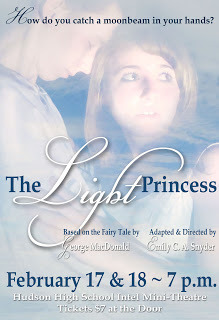 Light Princess is a fairy tale in every evocative sense of the word. It involves kings and queens, jester and witches, princes and princesses, a curse, true love, sword fights, heroism, flying, and something lovely. However, it isn't without it's depth: as the story keeps emphasizing, for true joy one also needs the possibility of sorrow.
Light Princess is a fairy tale in every evocative sense of the word. It involves kings and queens, jester and witches, princes and princesses, a curse, true love, sword fights, heroism, flying, and something lovely. However, it isn't without it's depth: as the story keeps emphasizing, for true joy one also needs the possibility of sorrow.
So, in the midst of puns and nonsense, we also have a tale of revenge and self-sacrifice. And the knowledge that if laughter requires sorrow, then gravity requires light.
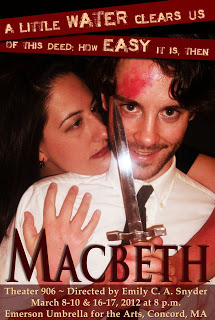 Conversely, Macbeth is the cautionary tale of the same. Although there is quite a lot that's funny about Macbeth (such as the title character agreeing after the murder that "Twas a rough night"), it's essentially a tale of how revenge can begat revenge. It's about how private offenses ripple through society, until no creature's innocence is spared.
Conversely, Macbeth is the cautionary tale of the same. Although there is quite a lot that's funny about Macbeth (such as the title character agreeing after the murder that "Twas a rough night"), it's essentially a tale of how revenge can begat revenge. It's about how private offenses ripple through society, until no creature's innocence is spared.
However, with that, we are also exploring how Macbeth was, originally, a good man. "What thou wouldst highly, thou wouldst holily," as Lady Macbeth says. Too often, casts and directors rather eagerly get to the murders and allow no human emotions in the aftermath; once Macbeth has killed once, he's eager to kill again. But every human, even the worst of us, is always in danger of salvation and capable of remorse, even at the end of things.
If there is any overlap between directing the two shows simultaneously, it probably lies in this overlap of good and evil, revenge and remorse, life and death - that place between in which we live on this earth. T. S. Eliot put it best, I feel, in his poem " The Hollow Men: Part V :" (1925)
Between the idea
And the reality
Between the motion
And the act
Falls the Shadow
For Thine is the Kingdom
Between the conception
And the creation
Between the emotion
And the response
Falls the Shadow
Life is very long
Between the desire
And the spasm
Between the potency
And the existence
Between the essence
And the descent
Falls the Shadow
For Thine is the Kingdom
For Thine is
Life is
For Thine is the
This is the way the world ends
This is the way the world ends
This is the way the world ends
Not with a bang but a whimper.Now, I personally don't agree with the ending line - and I write plays to that effect. Life ought to end with a triumphant trumpet blast, or with the sigh of the wind - not with a whimper. (Although in the case of the Macbeths, Eliot may have it right....) But the point that we live our lives inbetween - that we laugh when it's inappropriate and cry when we're happy - that sometimes the metaphorical truth is more honest than the facts - that there are "more things between Heaven and Earth than are dreamt of in our philosophy" - these things are important to me.
Important, too, is to give the world a little glimpse of beauty and laughter and the opportunity to throw toilet paper through an audience. That's Light Princess. But equally important is to show the erosion of innocence, the way our actions have effects, the terrible things we can do...and that we can allow to happen to others by doing nothing. That's Macbeth.
In terms of keeping the two of them straight in rehearsal, there really is no difficulty. The casts are sufficiently different from one another, the production needs and tonal elements keep the plays pleasantly separate from each other. Double rehearsal days, double production notes and production considerations do double the workload - that's a little rough at times, because I feel like I'm constantly playing catch-up on paperwork, favor-asking, information-giving - and somewhere in there relaxing with meaningless TV. And Downton Abbey.
That said, I am so utterly grateful to be working on both pieces. I'm so utterly grateful to be a working artist, and to be given the opportunity to write and direct and almost pay the bills. (Always open to patrons with cash...just saying!) Grateful to be doing great work with terrific folk on-stage and off. I'll conclude with one more poem:

 Light Princess is a fairy tale in every evocative sense of the word. It involves kings and queens, jester and witches, princes and princesses, a curse, true love, sword fights, heroism, flying, and something lovely. However, it isn't without it's depth: as the story keeps emphasizing, for true joy one also needs the possibility of sorrow.
Light Princess is a fairy tale in every evocative sense of the word. It involves kings and queens, jester and witches, princes and princesses, a curse, true love, sword fights, heroism, flying, and something lovely. However, it isn't without it's depth: as the story keeps emphasizing, for true joy one also needs the possibility of sorrow.So, in the midst of puns and nonsense, we also have a tale of revenge and self-sacrifice. And the knowledge that if laughter requires sorrow, then gravity requires light.
 Conversely, Macbeth is the cautionary tale of the same. Although there is quite a lot that's funny about Macbeth (such as the title character agreeing after the murder that "Twas a rough night"), it's essentially a tale of how revenge can begat revenge. It's about how private offenses ripple through society, until no creature's innocence is spared.
Conversely, Macbeth is the cautionary tale of the same. Although there is quite a lot that's funny about Macbeth (such as the title character agreeing after the murder that "Twas a rough night"), it's essentially a tale of how revenge can begat revenge. It's about how private offenses ripple through society, until no creature's innocence is spared.However, with that, we are also exploring how Macbeth was, originally, a good man. "What thou wouldst highly, thou wouldst holily," as Lady Macbeth says. Too often, casts and directors rather eagerly get to the murders and allow no human emotions in the aftermath; once Macbeth has killed once, he's eager to kill again. But every human, even the worst of us, is always in danger of salvation and capable of remorse, even at the end of things.
If there is any overlap between directing the two shows simultaneously, it probably lies in this overlap of good and evil, revenge and remorse, life and death - that place between in which we live on this earth. T. S. Eliot put it best, I feel, in his poem " The Hollow Men: Part V :" (1925)
Between the idea
And the reality
Between the motion
And the act
Falls the Shadow
For Thine is the Kingdom
Between the conception
And the creation
Between the emotion
And the response
Falls the Shadow
Life is very long
Between the desire
And the spasm
Between the potency
And the existence
Between the essence
And the descent
Falls the Shadow
For Thine is the Kingdom
For Thine is
Life is
For Thine is the
This is the way the world ends
This is the way the world ends
This is the way the world ends
Not with a bang but a whimper.Now, I personally don't agree with the ending line - and I write plays to that effect. Life ought to end with a triumphant trumpet blast, or with the sigh of the wind - not with a whimper. (Although in the case of the Macbeths, Eliot may have it right....) But the point that we live our lives inbetween - that we laugh when it's inappropriate and cry when we're happy - that sometimes the metaphorical truth is more honest than the facts - that there are "more things between Heaven and Earth than are dreamt of in our philosophy" - these things are important to me.
Important, too, is to give the world a little glimpse of beauty and laughter and the opportunity to throw toilet paper through an audience. That's Light Princess. But equally important is to show the erosion of innocence, the way our actions have effects, the terrible things we can do...and that we can allow to happen to others by doing nothing. That's Macbeth.
In terms of keeping the two of them straight in rehearsal, there really is no difficulty. The casts are sufficiently different from one another, the production needs and tonal elements keep the plays pleasantly separate from each other. Double rehearsal days, double production notes and production considerations do double the workload - that's a little rough at times, because I feel like I'm constantly playing catch-up on paperwork, favor-asking, information-giving - and somewhere in there relaxing with meaningless TV. And Downton Abbey.
That said, I am so utterly grateful to be working on both pieces. I'm so utterly grateful to be a working artist, and to be given the opportunity to write and direct and almost pay the bills. (Always open to patrons with cash...just saying!) Grateful to be doing great work with terrific folk on-stage and off. I'll conclude with one more poem:
"My candle burns at both ends;
It will not last the night;
But ah, my foes, and oh, my friends—
It gives a lovely light!"
~ Edna St. Vincent Millay, "First Fig"
from A Few Figs and Thistles (1920)
Published on January 31, 2012 22:48
January 26, 2012
Macbeth: Publicity Stills
Published on January 26, 2012 23:08
January 21, 2012
House of Strangeways: Letters Left Unopened
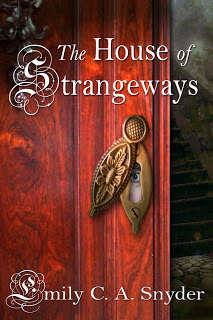 This week's House of Strangeways we look at those letters that we should have read, but that we foolishly left unopened. Particularly those from Aunt Esmeralda to our miss Serafine Meadowlark!
This week's House of Strangeways we look at those letters that we should have read, but that we foolishly left unopened. Particularly those from Aunt Esmeralda to our miss Serafine Meadowlark!Remember that you can read all of the previous chapters here , and this week's chapter here or by pressing the fly-out arrow in the top right corner.
If you're looking for the first appearance of Aunt Esmeralda, the Hungarian Marquess, make sure you read her debut chapter, Voices of the Dead .
You can also get exclusive clues, games and more at the official website!
Published on January 21, 2012 17:55
January 14, 2012
House of Strangeways: Stories within Stories
 In this week's House of Strangeways, we get to hear more from Araminta about the mysterious locksmith, who could open any door but the one that hid his wife, who first debuted
here
.
In this week's House of Strangeways, we get to hear more from Araminta about the mysterious locksmith, who could open any door but the one that hid his wife, who first debuted
here
.However, as much fun as Araminta has writing her own stories within stories, it should be remembered that simultaneously our governess, Miss Sera Meadowlark, is currently embarked on a possibly fatal journey to consult with Mr Jeremy Cavendish Mumm (read that here ).
To read this week's chapter, you can click here , or press the fly-away button in the top right hand corner below.
MORE CONTENT
Don't forget to keep an eye on the website for exclusive content, games and clues. And you can read all the House of Strangeways chapters here !
AND A SPECIAL PRIZE!
Comment below about how you would end the story of The Two Horses, and make sure to leave your e-mail address, to win a special House of Strangeways prize! Two lucky winners (chosen at random from the commenters - one comment per person, please) will be e-mailed an exclusive clue to unravelling the mystery of the House of Strangeways by next weekend. Enter today!
Published on January 14, 2012 12:17
Posters, by Design
I'm in the process of revamping the theatrical side of
my website
, and as a consequence I've been designing posters for some of my shows that either have not been performed yet, or whose initial poster I wanted to improve. I'm pretty happy with how they turned out, and I thought that I'd share them with you.
And, of course, if you're interested in performing one of my plays that's not published through Playscripts , just drop me a line here, on Twitter , or my Facebook page! (That's how The Passion Play was performed last year in Dublin, Ireland!)
You can click on an image to enlarge it. Click on the textual title to go to the website page.
Plays in Blank Verse
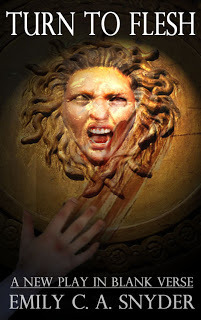
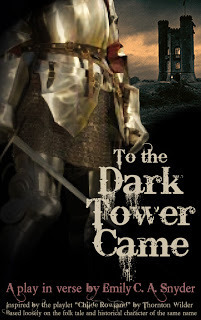
Mystery Plays
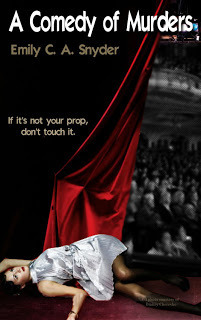
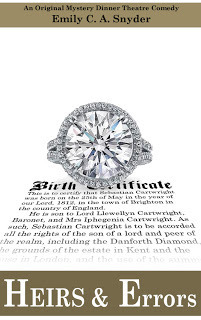
Modern Plays

And, of course, if you're interested in performing one of my plays that's not published through Playscripts , just drop me a line here, on Twitter , or my Facebook page! (That's how The Passion Play was performed last year in Dublin, Ireland!)
You can click on an image to enlarge it. Click on the textual title to go to the website page.
Plays in Blank Verse


Mystery Plays


Modern Plays

Published on January 14, 2012 00:29
January 8, 2012
House of Strangeways: Memories of Stone
 Here's the first part of a two-parter for the latest installment of The House of Strangeways. The second part of this chapter will be posted here as well!
Here's the first part of a two-parter for the latest installment of The House of Strangeways. The second part of this chapter will be posted here as well!Do be warned: although no bodices are ripped in any fashion, some liberties are taken. Victorian liberties, but liberties nonetheless. Best read with chocolate by your side.
In the second part, we'll learn more about the locksmith from Araminta, as well as what happened to Miss Meadowlark. The picture from below is somehow involved, as well as the signature of the artist in the lower left corner.
To catch up on the House of Strangeways you can read it all here . And make sure that you also check out the website ! You can press the fly-away in the top left corner below, or read the first part of the latest chapter here .

Also, it's entirely likely that - due to the obligations of the two shows I'm directing - Free Fridays will be posted somewhere between Friday and Sundays at least through Easter. See you then!
Published on January 08, 2012 13:27
January 3, 2012
From Bad to Verse (Or: Ten Syllables Do Not Make a Foot)
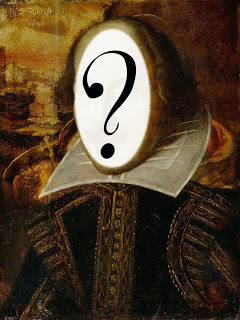 Continuing my examination of writing "new Shakespearean plays" - i.e., new plays in blank verse, particularly iambic pentameter - I thought I'd take a moment to examine what exactly is meant by "iambic pentameter."
Continuing my examination of writing "new Shakespearean plays" - i.e., new plays in blank verse, particularly iambic pentameter - I thought I'd take a moment to examine what exactly is meant by "iambic pentameter."Now, this may seem a redundant exercise; after all, there are books and entire schools devoted to the subject. However, with the occasional sonnet-enthusiast, most of these books and schools are dedicated to the performing of iambic pentameter (or at least the reading or appreciation of it), rather than the writing. More, should one find a sonnet-enthusiast, their interest will not lie in how iambic pentameter may be used in dramatic playwriting.
NOTE: For this post, I will be critiquing a few modern iambic pentameter plays other than my own (unless duly noted). I do not know any of these playwrights personally, and hold them no ill will. Nor do I think their plays are the only blank verse plays currently being written. They are merely the only ones to which I have some access to the script.THE ELEMENTS OF STYLISHNESS
There is a different, a very important difference, between writing a stand alone sonnet and writing a play. While a sonnet may seem like a little play, in point of fact, it doesn't have to be. A play written in verse, however, must first be a play...and then written in verse.
So, presuming that you've got your plot, characters, thought (philosophy/worldview) and everything else necessary to a play in order, let's skip right ahead to how to write your play in blank verse, specifically in iambic pentameter. There are basically two elements to this:
1) The beauty of the verse
2) The practicality of the verse
Although the two are intertwined, we're going to begin with the latter. What I mean by the practicality of the verse is essentially:
1) Does the verse convey the character and the plot like any decent line of dialogue should?
2) Is the verse easy to say (does it fall "trippingly from the tongue")?
PURPLE PROSE DOES NOT MEAN PUNCHING GRAMMAR IN THE EYE
The first point will actually be covered somewhat when we look at the beauty of the verse, and has been covered admirably elsewhere by folk who write about dialogue for characters, but the main thing you want to watch out for when writing plays in verse is that you don't become so florid that you actually start maiming the rules of grammar.
Occasionally you can get away with "not poetic speech" - that is, language that goes beyond poetic contractions (o'er, e'er, yestere'en), anglo-saxon verb endings (basically, pronouncing the -ed in such things as "believ-ed"), metaphors that serve as impromptu verbs/adjectives/adverbs/nouns ("when fallen dew-drop from the anguished sky")...but please, for the love of all that's holy, don't torture the grammar past all recognition.
For example, it is not beautiful, easy or even sensible to say:
"How wonder, how marvelous this tale go."First of all, the adjective is "wonderful" and secondly unless your character is supposed to have a dialect, a tale "goes" not "go" - even if it's easier to rhyme with the open vowel.
You can write "How wonderful, how marvelous this tale!" which is a good line of blank verse, and a perfect line of iambic pentameter! "How WON-der-FUL, how MAR-vel-LOUS this TALE!"
Likewise, although it's very tempting to give into the fact that you are writing poetry, for Heaven's sake, let the actors wear the frilly shirt, not your verse. By which I mean, if the line makes no bloody sense...kill it. For example, I've just spent the past half hour seriously trying to understand:
"Vest the house folly of scenes jesters danceI really don't know. "Vest" isn't a verb, traditionally. "Folly of scenes" and "jesters dance" are fine phrases on their own, but need prepositions, antecedents, or verbs to make them mean anything. And in the second line "givings" confuses me since it should be a verb, but is a plural non-noun, followed by two adjectives that want to be adverbs and end up modifying nothing.
Merriment givings helpful wonderful."
Moreover, as a performer, I have no idea what idea I'm supposed to convey. Now, I grant you - Shakespeare can seem to be just as oblique. After all, this is the woman who played Feste the Jester in Twelfth Night, a role that required me to cross reference just about every other word...but that was because I was unfamiliar with the vocabulary, not confused by the grammar.
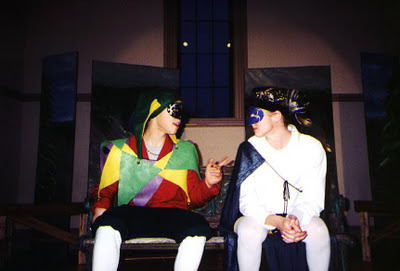 From my 2002 production of Twelfth Night, Act III, Scene 1
From my 2002 production of Twelfth Night, Act III, Scene 1No...that's not me. But it is Feste the Jester! I'll give you an example of a seemingly-bizarre line from our dear old Billy Shakes.
"No, indeed, sir; the Lady Olivia has no folly: she will keep no fool, sir, till she be married; and fools are as like husbands as pilchards are to herrings; the husband's the bigger: I am indeed not her fool, but her corrupter of words."
Essentially:"No, indeed, sir; the Lady Olivia [whom I played Feste had a crush on thanks to this speech] has no folly; she will keep no fool, sir, till she be married; and fools are as like husbands as [a small fish] are to herrings; the husband's the bigger [fool]: I am indeed not her fool [husband], but her corrupter of words."Moreover, the speech is terrifically easy to say. Quite a bit of it is in iambic anyway, since most of English naturally falls into iambic meter without trying very hard at all! In fact, although there's also plenty of metrical variety, the trickiest bit is almost entirely in iambic:"...and FOOLS| are AS| like HUS|-bands as PIL|-chards ARE| to HER-rings..."If I were to attempt to make sense of the "vest the house" line from above, I'd first have to look at the grammar, and then at the meter. I suppose, my best stab at it (not being able to sort out what the author meant):"Bedeck the house, then, with tapestried scenes:DON'T SHOOT YOUR VERSE IN THE PROVERBIAL FOOT
Pick out in gold thread both fools and their folly;
Merriment gives us th'most wonderous sight."
Besides remembering that blank verse is not carte blanche to destroy the rules of proper English, the other thing one should be aware of is the music of a line of iambic pentameter. Shakespeare performers often talk about something called "riding the verse." What this means is that just as the driving force of a can-can (which is what, say, Lady Gaga employs almost always) will set your toe tapping, so the insistent beat of iambic pentameter likewise becomes the invisible thrum of any good verse drama.
PENTAMETER IS NOT HAIKU: A Dictionary
The first silliness that sees to crop up by those writing in iambic pentameter is the belief that a "foot of verse' means "two syllables" and that therefore, mathematically, "pentameter" equals "ten syllables." It's a reasonable assumption...if we were writing a haiku. Which is based (at least in part) on number of syllables more than number of metrical feet. So, let's go back and refresh.
Scansion: The art of "riding the verse," hitting the stresses and unstresses, both as a performer and as a playwright. This is the inherent music of the verse.
Metrical foot: A collection of syllables (usually about two to four) that often have an interior beat Read all about them here. You'll notice that every type of metrical foot has at least one stress (downbeat), except for pyrrhus, tribrach, and tetrabrach. (I won't go into people contesting that those metrical feet don't exist. Edgar Allen Poe is their major detractor and you can read his reasonings on your own.)
Pentameter: Five of those collection of syllables. So, a line can range anywhere from ten-ish to twenty syllables (if you do all tetrasyllables...which is almost never done...although you can do it if you want).
Stress/Unstress: The stress if the STRESSED or emphasized syllable, while the unstressed is clearly the syllable not stressed. Such as the "un" in "un-STRESSED." (Which is beautifully appropriate.)
Iamb: A metrical foot of two syallables where the first syllable is unstressed, and the second one is stressed. Most of standard English tends to fall primarily into iambs, such as "hel-LO!" and "good NIGHT" and "f*(% YOU."
Feminine Endings: Basically, this means that there's a left-over syallable that everyone politely doesn't point out. An iambic phrase with a feminine ending is: "i LOVE you." You can also argue that this is an amphibrach, but that's just being snooty. However, if you emphasized the last syllable ("i love YOU") then you've done a foot of anapest. You can continue to go nuts looking at metrical feet here.
Iambic Pentameter: This means that most of the metrical feet will probably be iambs, and that...and this is the most important thing...there will be five [metrical] stresses.
SHAKESPEARE SHOWS OFF: The Scansion of Sonnets and Speeches
This is important. This is perhaps the most important point. We're looking for five metrical stresses - that is, five metrical downbeats. Let's take a look at two Shakespearean sonnets:
Sonnet 18Very early Shakespeare; strict iambic pentameterShall I compare thee to a summer's day?
Thou art more lovely and temperate:
Rough winds do shake the darling buds of May,
And summer's lease hath all too short a date:
shall I | com-PARE | thee TO | a SUM- | -mer's DAY?
thou ART | more LOVE- | ly AND | more TEM- | per-ATE:
rough WINDS | do SHAKE | the DAR- | -ling BUDS | of MAY,
and SUM- | -mer's LEASE | hath ALL | too SHORT | a DATE:
As opposed to:
Sonnet 116Mid-career Shakespeare; playing with metrical feetLet me not to the marriage of true mindsAdmit impediments. Love is not love
Which alters when it alteration finds,Or bends with the remover to remove:LET ME | NOT to | the MAR- | -riage OF | true MINDSad-MIT | im-PED- | -i-MENTS.| LOVE is | NOT LOVE
which AL- | -ters WHEN | it AL- | -ter-A- | -tion FINDS,
or BENDS | with THE | re-MOV-| -er TO | re-MOVE:
As you can see in the latter example, Shakespeare plays with the metrical verse, beginning his first line with a spondee, and ending his second line with the same, while in the third and fourth line he returns to the iamb. Let's take a look at one more than doesn't also have ten syllables. This is from I.2 of Macbeth, and if you count them out, you'll see that not all the lines come out to ten:Doubtful it stood; (finishing the previous line, to make 9 syllables)
As two spent swimmers, that do cling together (11)
And choke their art. The merciless Macdonalwald-- (12)
Worthy to be a rebel, for to that (10)
The multiplying villanies of nature (11)
Do swarm upon him--from the western isles (10)
Of kerns and gallowglasses is supplied; (10)
And fortune, on his damned quarrel smiling, (10)
Show'd like a rebel's whore: but all's too weak: (10)
For brave Macbeth--well he deserves that name-- (10)
Disdaining fortune, with his brandish'd steel, (10)
Which smoked with bloody execution, (9 - unless you pronounce it ex-e-CU-ti-ON)
Like valour's minion carved out his passage (10)
Till he faced the slave; (5)
Which ne'er shook hands, nor bade farewell to him, (10)
Till he unseam'd him from the nave to the chaps, (11)
And fix'd his head upon our battlements. (10)
Taking a look at the irregular lines, we still see five metric feet (pentameter):as TWO | spent SWIM- | -mers, THAT | do CLING | to-GETH-er (feminine ending)
and CHOKE | their ART. | The MERC-i-less (secundus paeon) | mac-DON- | -al-WALD
You get the idea. A good trick I learnt was to count out each downbeat stress on your fingers. Five fingers, five down-beat stresses. It's better than counting out ten syllables, more accurate, too, and it allows you to play with meter more easily. Go ahead and try it on some Shakespeare. You'll see what I mean.
MODERN METERS: Critiquing Two New Plays
So, let's take a look some of these modern iambic plays. For each, I've taken a random sample from somewhere in the middle of whatever they have to offer. I'll put my critique (in parenthetical blue) on that selection for what it's worth.Stuart SpencerGo to Ground
by Stuart Spencer
Page 81
EVELYN. We set a date. January Tenth.
(For the metrical beats: JAN-u-AR-y TENTH. 9 syllables, but he uses the trochee form of a feminine ending, which stints a typical pentameter line of that last syllable. Totally kewl.)
And you're invited.
OLIVER. You expect me to - ... ?
EVELYN. I didn't say 'expect'. I said invited.
OLIVER. Evvie, this is crazy and you know
[sic] It.
(This is my only major complaint on this page. I have no idea why he put "it" on its own line, even though he picks up the remaining syllables with Evelyn's line following. I grant you that:
"EV-vie | THIS is | CRA-zy | AND you | KNOW"
feels like five lines of spondee - that is, a foot of STRESS-unstressed - but he cuts off the last syllable and pastes it into the following line, perhaps in an attempt to make that iambic? When it's clearly another spondee line. There's no good reason to put "it" at the top of the metrical line. Look at the rhythm without "it."
"NO, that's | IT. it's | REAL-ly | NOT. it's | NOR-mal"
Perfect spondee! As is Oliver's previous line. This is why it's important to understand that although five stresses are important, it's just as important not to get bogged down in the iambic part of it. Five metrical feet. That's what we want. Yup yup yup!
EVELYN. No, that's it. It's really not. It's normal,
Though I don't expect that word to be
In your vocabulary.
(Two small quibbles here. First: Changing "Though" to "Although" would give the line the natural iambic spring it wants: "al-THOUGH | i DON'T | ex-PECT | that WORD | to BE."
Second: You have to pronounce all the potential syllables of "vo-CAB-u-LAR-y" in order to get the iambic, which may be plausible since the characters are terribly upper class. My tendency is to put in the customary schwas, to make it: "in YOUR | vo-CAB- | -lur-y." Again, it's totally legit to end with a pyrrhus...but if she's angry, this is a mumbly and dangerously rhyming end. She's been so strong with her verse, I'd love a stronger retort from her.)
OLIVER. See? The anger.
What's up with the anger if you don't
Have any feelings?
(I actually personally admire the author for using such modern language in modern verse, but "What's up" throws off the meter, because the inclination is to stay in pure iambic, which throws these terribly upper crust fox hunters into 1970's sitcom territory:
"what's UP | with THE | an-GER | if YOU | don't"
However, I believe he meant it to be another spondee line, since anger is typically pronounced ANG-er. This would read a little better, with five stresses rather than the above four, as so:
"WHAT'S up | WITH the | AN-ger | IF you | DON'T"
Either way, though, we really feel that dangling syllable. I can respect that the author may have wanted the actor to really hit the word "DON'T" but the fact that I've just spent a good amount of time trying to figure out the first two syllables may encourage the author to tweak the line slightly. Maybe:
"Why bother with the anger if you don't" which would read as:
"why BOTH- | -er WITH | the ANG- | -er IF | you DON'T"
This has the added benefit of not only not tripping up the actor while he's riding the verse, but it also allows the author to naturally hit the "if" which is a wonderfully loaded word. Of course, this is also available in the spondee line, but you have to work at it. And this is too much work for this line which is really just a lead in to Evelyn's speech:)
EVELYN. I have feelings Oliver.
Who's [sic] says I don't have feelings? But
It's over, Ollie. [Name of the Lord.] Seven years!
It's over! Sure I had a few good cries
I wrote some letters but thank God I never
Sent them. Then I - well, I guess I just
Moved on. I fin'lly stopped and said enough.
You obviously had forgotten me -
Is it so shocking I should do the same?
(I like the way he's divided up the speech here. The second line needs another foot - count it out yourself - but it doesn't disrupt the flow. I like that he put the cut on "But" so that the actor naturally leans on that very loaded word. Same thing with "never" and "just." There are just enough metrical variations and feminine line endings to keep the meter interesting, while still having the underlying thrum of the iamb. I like this speech! I could perform this speech! Nicely done!)
OLIVER. Okay. Okay. Okay. In other words
The nightmare isn't over. I'm still in it.
(I have a feeling this scene-ending line is more dramatic in the context of the full play. The triple "okays" feel a little cheap to me. Perhaps he's nodding to Hamlet's "Words words words" or "well well well," which I appreciate, but otherwise I personally feel that the "okays" lessen the power of the line. Consider if you took them out:
"In other words, the nightmare isn't over;
I'm still in it."
"in OTH- | -er WORDS | the NIGHT- | -mare IS- | -n't OV-er;
I'M STILL | IN IT."
Personally, I think that's more powerful. However, it may have been a deliberate character choice. Or maybe the author felt that ending on a half-line was a cheat. Regardless, I've liked what I've seen of this play. The verse is solid, the diction very modern which is exciting, all in all very good!)Daniel GuytonThe Mother of God Visits Hell
by Daniel Guyton
Page 8
GOD. I must forbid it, mother. 'Tis rash.
MARY. 'Tis rash to salve the wounds that we inflict?
(The first line stumbles a little bit, missing an entire foot. Although, perhaps the intent was that the previous foot was said off-stage, as the two rush on? Regardless, since this is the very top of the show, I would suggest having a full line to set the stage, such as:
"i MUST | for-BID | it, MOTH-er. | the SCHEME | is RASH."
This also gets away from using " 'tis " which is a lovely contraction and I've overused it my own fair share, but it seems like trying too hard for a first and second line. That said, I think the second line is beautiful. Try saying it outloud and be hyper-aware of your tongue. The consonants get harsher and more gutteral as the line progresses, without ever losing their eloquence. A good line! It actually gets better from here:)
GOD. No, 'tis rash to salvage wounds which worms inflict.
What weight have we we with worms? With water bugs?
With moping yellow maggots and decay?
Nay, I say we stay up here in Heaven,
Whilst they betray the flesh of sinful men.
Thou and I and Seraphim shall play th'harps
Divine, while vermin, scum and scavengers
Beneath the earth shall dine. I say again...
(I'll go into this more, but I'm vastly amused and rather do enjoy the poetical wilderness into which the speaker wanders. It's also fun to deal with all that alliteration in the second line. Howsomever, this is a critique, so a few points:
I'd probably waffle about putting "No" on its own line, since it throws off the meter of the first line. Also, a statement such as "No" can have a lot of silence around it. Performers may thank you for giving them white space around the line - time to get really frustrated at Mary, and then regroup for a terribly civil, iambic reply. Of course, the author seems to want the performer to take no time before he rushes into " 'tis rash to salvage wounds...." It's not a big deal either way.
"Whilst they betray the flesh of sinful men" gives me a little pause purely for understanding. Who are "they?" If the line were immediately after "yellow maggots and decay" then I'd presume he's talking about how we'll all die and become food for bugs...but the last antecedent as it's written now either says "we" (God and Mary) will say up in Heaven and betray the flesh of sinful man...or Heaven itself will betray the flesh of sinful man. This is why the rules of grammar supersede verse. It would make more sense to have written:
"With moping yellow maggots and decay?
Let them betray the flesh of sinful men,
Whilst thou and I in Heaven sinless stay."
Of course, this would require a tweak in the next line that begins with "thou and I." But that line requires a tweak anyway, so let's look at it. As written, it has too many feet - despite the author attempting to combine th'harps...which would require a Cockney God, who normally pronounced "harps" without the "h." Not impossible, but not most performers first instinct.
Worse, the line breaks on "harps" - which isn't itself so bad, except that it continues with "divine" on the following line. What this means for me as a performer is that I have to justify saying: "harps" with some sort of emphasis, when the real emphasis is on the more potent word: "divine." An easy fix would be:
"The Seraphim shall play the harps divine"
Which allows the actor to hit the best word in the sentence, as well as to speak in perfect iambic which seems appropriate for the serene description of Heaven. Now, of course, we're short a foot. We could let the line go ragged, as so:
"while VER- | -min SCUM | and SCAV- | -en-GERS"
Or we could add in a foot
"while VER- | -min FILTH | -y SCUM | and SCAV- | -en-GERS"
Either one's fine, really. A non-iambic foot would be even better, just to rough up the line, but that'll do. And the rest is fine, and a feeder for:)
Mary. No need. I heard thee fine the other time.
(A nice rejoinder! And perfect iambic to boot. See? You don't have to try so hard.)
IN CONCLUSION
Yes, writing in verse takes a lot of thought. I'll do another post to guide a beginner through writing the first few pages of a poetical play, but next I'll be turning my attention towards the poetry of the plays. In the nonce, make sure to check out this entire series on Writing Iambic Pentameter.
Published on January 03, 2012 03:30
December 31, 2011
How I Went Crazy in 2011
It's that time of year again to look back on what was...and stop looking at the colour-coded calendar of the future.
I'd say that 2011 was the year I went crazy. Not actually emotional break-downage. (That was 2008-2009, when my personal life and the economy went cablooey in cahoots. Everyone should have a year they actually break down. It makes everything else so much more manageable.)
But rather, 2011 was the year that I artistically bezerked.
Now, I am a bezerker by trade. That is, I waffle and I waffle and I waffle over a life-altering decision...and then, rather than carefully and thoughtfully going step by step, I sort of scream my barbaric "Yawp!" at the world and run at it full-throttle.
That's how I chose a college. That's how I joined household (Catholic sororities). That's how I became a teacher. That's how I became a director. That's how I became an author. And, thanks to the complete lack of jobs in America...that's how in 2011, I became a working artist.
It always starts the same way. I say to myself: "Myself! [What you're about to do] is crazy. No one ever does [that thing]. No one can actually make a living at [that thing]. So I'll do [that thing] for a lark...and see if anyone takes me seriously."
And then they do.
And then I say: "[Expletive.]"
However, what I've learnt from being a working artist is that you had better have a colour-coded calendar. And you had better be able to compartmentalize. Now, I've got the former, and I'm working on the latter. I'm also trying to learn how to juggle - because while I've gotten to the point of beginning to understand how to be a working theatrical director, I'm still learning how to be a working author.
But anywho...these are the things I have done in 2011. And although it drove me nuts, and it meant I had almost no time...I like being busy. And I like doing what I do.
So, thank You, God, for throwing me into these ridiculous opportunities, and please still be there to catch me when it feels like I'm falling apart. Amen.
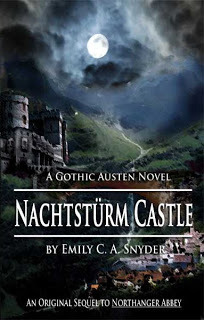 Edited to add: And thank you to
Austenesque Reviews
not only for first bringing me into the authorial blogosphere (yes, you can thank
Meredith Esparza
for everything), but also for awarding Nachtsturm Castle "Best Non-Pride and Prejudice Austenesque Sequel" of the year! Yippeeeeeeeee! (
Buy your copy today!
)
Edited to add: And thank you to
Austenesque Reviews
not only for first bringing me into the authorial blogosphere (yes, you can thank
Meredith Esparza
for everything), but also for awarding Nachtsturm Castle "Best Non-Pride and Prejudice Austenesque Sequel" of the year! Yippeeeeeeeee! (
Buy your copy today!
)
I started running out of time with all that happened theatrically, but I really want to take a moment to thank those who welcomed me into the on-line author community. Meredith dragged me in for the Austenesque Extravaganza and my first twitter party ever. Then the Indie Jane girls, Maria Grazia , and the Regency Ladies really encouraged me and gave me opportunities - more than I deserve or than I knew. And to Laura McDonald who first gave me the opportunity to publish through the wonderful Girlebooks imprint. Thank you, to all of you.
And bear with me as I try to juggle plays and prose!
Theatre (Directing)
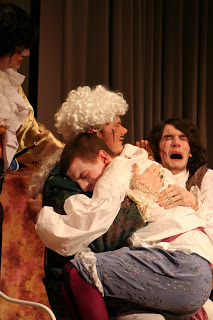 Tartuffe: A life-long desire to direct this play finally came to pass in 2010-2011 when we first produced the script in its entirety...and then a whirlwind, highly cut down version for the Massachusetts Drama Guild Festival. We were non-competitive last year, in part because we didn't quite know what we were getting into, and in part because we had been working on this play since October 2010...and were ending in March 2011...and that's a long time for high school students to have to see each other in a play. That said, each iteration of Moliere's greatest work became better and better. So that by the time we finally got to Festival, when the Tartuffe actors left the stage, the other actors from other schools at Festival got on their knees and bowed down to my actors. We were told by the judges we wouldn't have gone on anyway, because essentially we were too funny, but what a wonderful critique!
Tartuffe: A life-long desire to direct this play finally came to pass in 2010-2011 when we first produced the script in its entirety...and then a whirlwind, highly cut down version for the Massachusetts Drama Guild Festival. We were non-competitive last year, in part because we didn't quite know what we were getting into, and in part because we had been working on this play since October 2010...and were ending in March 2011...and that's a long time for high school students to have to see each other in a play. That said, each iteration of Moliere's greatest work became better and better. So that by the time we finally got to Festival, when the Tartuffe actors left the stage, the other actors from other schools at Festival got on their knees and bowed down to my actors. We were told by the judges we wouldn't have gone on anyway, because essentially we were too funny, but what a wonderful critique!
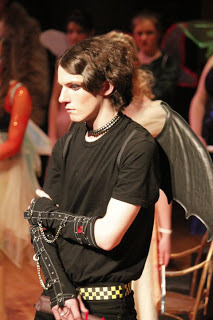
Curses!, No Boys Allowed, Crying Wolf: During tech for Little Shop of Horrors (October 2010), I mentioned to Mrs. McKenzie who runs the HHS drama department that it might be a good idea to do an 8th and 9th grade play. No cuts, short rehearsal period - something just for those people who might not otherwise get cast; something to give them experience and bond them together as a group. What we ended up doing were three original fractured fairy tales, which were terribly fun to put on. They're part of my Grimms Aghast series, and it was neat to return to fairy godmother Lilynimble Merryweather...and learn more about her family: her overbearing mother, Queen Morningstar, and her ne'er-do-well brother, Hexmaker Gloamingwand! It was a really wonderful experience, and I'm glad to say that it continued through to this year!
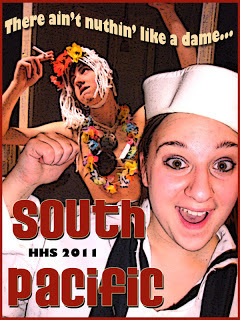 South Pacific: I wasn't supposed to work on the all-school musical for 2011 (because I was doing Tartuffe & Curses! simultaneously) but Mrs. McKenzie's music director dropped out two weeks before show. So I got called in as a "vocal coach" and taught the ridiculously easy and choral/harmony-free score to some pretty durn talented kids. I also took some promotional photos, which is always fun, and I oversaw the sound design like usual. That show actually had a lot of sound issues, b/c I was running backstage anyway to get a wet mike on Nellie for the *nnnnnngh* hair-washing scene...but for whatever reason the mikes kept shorting out, etc., so I was constantly running back and forth to the different wing, ripping mikes off of high school students when they stepped off the stage for just a second, re-miking them and throwing them back on with none the wiser. A technical ninja if I do say so myself. *plop*
South Pacific: I wasn't supposed to work on the all-school musical for 2011 (because I was doing Tartuffe & Curses! simultaneously) but Mrs. McKenzie's music director dropped out two weeks before show. So I got called in as a "vocal coach" and taught the ridiculously easy and choral/harmony-free score to some pretty durn talented kids. I also took some promotional photos, which is always fun, and I oversaw the sound design like usual. That show actually had a lot of sound issues, b/c I was running backstage anyway to get a wet mike on Nellie for the *nnnnnngh* hair-washing scene...but for whatever reason the mikes kept shorting out, etc., so I was constantly running back and forth to the different wing, ripping mikes off of high school students when they stepped off the stage for just a second, re-miking them and throwing them back on with none the wiser. A technical ninja if I do say so myself. *plop*
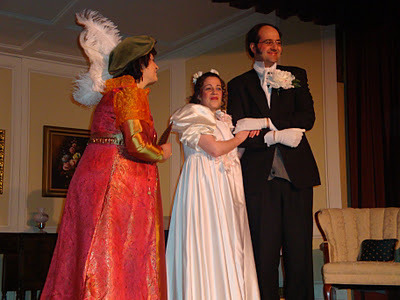 Heirs & Errors: While I directed those shows, I also directed another original play: this one the first dinner mystery theatre that I'd ever written. It was a really interesting experience, because writing a mystery requires a lot of forethought (of which I typically have little). Thanks to the wonderful cast, however, they not only brought the show to life, but they even allowed me to see places where we could be a little more overt in our clues and consequently emotional with our acting. We also did a lot of cast and audience interaction, which is always fun. Once again, though, we had some technical issues since 1) we had to cancel opening night b/c not enough publicity had been done to get enough audience in (however we ran it anyway for a select few who could only make that night) and 2) it was in an ooooooold building with weird wiring, so sometimes the sound or lights would blow out if we turned them up too high. (Oh the joys of old wiring.) Fortunately, we sorted out the bugs during tech...only to have one of our leads blow out his knee before the last night of performance. He decided to go on anyway, with a cane, and actually used that cane to very good advantage...which made me wish he'd asked for a cane earlier.
Heirs & Errors: While I directed those shows, I also directed another original play: this one the first dinner mystery theatre that I'd ever written. It was a really interesting experience, because writing a mystery requires a lot of forethought (of which I typically have little). Thanks to the wonderful cast, however, they not only brought the show to life, but they even allowed me to see places where we could be a little more overt in our clues and consequently emotional with our acting. We also did a lot of cast and audience interaction, which is always fun. Once again, though, we had some technical issues since 1) we had to cancel opening night b/c not enough publicity had been done to get enough audience in (however we ran it anyway for a select few who could only make that night) and 2) it was in an ooooooold building with weird wiring, so sometimes the sound or lights would blow out if we turned them up too high. (Oh the joys of old wiring.) Fortunately, we sorted out the bugs during tech...only to have one of our leads blow out his knee before the last night of performance. He decided to go on anyway, with a cane, and actually used that cane to very good advantage...which made me wish he'd asked for a cane earlier.
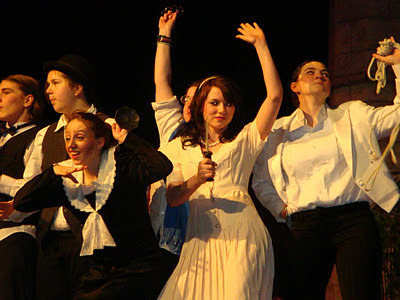
A Comedy of Murders: I'm the sophomore class play director, for HHS competitive plays, and I knew we'd have quite a few people for the year I directed. So I wrote a play with thirteen parts...and then had to add an extra part anyway! I also wrote a show that only needed one male actor...and then I was blessed with two! It was a fun show, full of in-jokes, and at the very end we let our murderer go running through the audience stabbing everyone (yay theatre of cruelty?). We also had an invited dress rehearsal, where we worked out what we would do should an audience member choose to go on-stage. I'd say that, although I've certainly worked since with audience interaction, A Comedy of Murders, is sort of the ending-place for the moment of really exploring what you can and can't get the audience to do. It's fascinating: the audience will play along, but refuses to destroy a show. Even when invited. You can watch the whole thing (single angle) below:
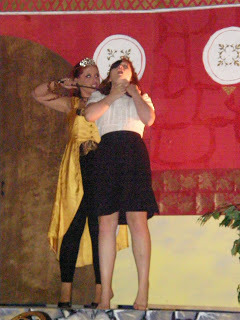 As You Like It: I've wanted to do this show since 2000, and this year I had my chance. We had a great Rosalind, and she had a wonderful cast, and we had one of our more ornate sets...which took up a lot of time painting, and which also took up a lot of time putting back in Holliston...in the rain...without raincoats...up a muddy hill...with only a few of the cast and crew. That wasn't so fun. I also got to play with gobos, which was neat. I'll admit, this is a show that I think I'm going to come back to a lot. It's a rich play, and I'm still processing it. One of the things I really liked, though, was how the script was rearranged so that we kept a through-line from Act I's politics into the woods. It was also fun "Killing Kayleigh Kenny" (aka Jacques LeBeau - see right). And showing Oliver and Orlando fighting one another! And Touchstone's puppets. And the improv about the good china that Celia and Rosalind had.
As You Like It: I've wanted to do this show since 2000, and this year I had my chance. We had a great Rosalind, and she had a wonderful cast, and we had one of our more ornate sets...which took up a lot of time painting, and which also took up a lot of time putting back in Holliston...in the rain...without raincoats...up a muddy hill...with only a few of the cast and crew. That wasn't so fun. I also got to play with gobos, which was neat. I'll admit, this is a show that I think I'm going to come back to a lot. It's a rich play, and I'm still processing it. One of the things I really liked, though, was how the script was rearranged so that we kept a through-line from Act I's politics into the woods. It was also fun "Killing Kayleigh Kenny" (aka Jacques LeBeau - see right). And showing Oliver and Orlando fighting one another! And Touchstone's puppets. And the improv about the good china that Celia and Rosalind had.
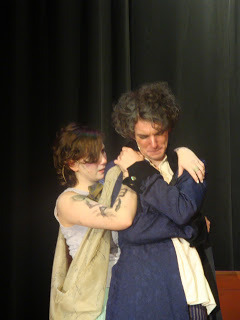 The Tempest: I've posted quite a bit about this play...but there are two things that really make me proud of it: 1) that although the cast and crew were both huge...and of equal number, there were no cliques, but a true feeling of ensemble and 2) that because of that, everyone made this experience and this show luminous to work on. We had a ton of improv rehearsals to get into the backstory...especially of the nobles. We had live music, composed just for the show, which was gorgeous to listen to, and ended up being the life and blood of our piece. We had amazing costumes, hair/make-up, and a brilliant set, wonderful lighting and sound design, and just fantastic stage managers and crew. Everything just came together. Except, of course, for when our Prospero jumped into the couch at an early rehearsal and had to go to the hospital (argh)...and then couldn't make opening night...and I went on (with script) to play Prospero. (I'll write about that another time.) And then our Stephano got sick for closing night...and I asked a crew member to go on! Regardless, it was a beautiful play and I'd love to revisit it. Theatre (Beginning, Teaching, Writing)
The Tempest: I've posted quite a bit about this play...but there are two things that really make me proud of it: 1) that although the cast and crew were both huge...and of equal number, there were no cliques, but a true feeling of ensemble and 2) that because of that, everyone made this experience and this show luminous to work on. We had a ton of improv rehearsals to get into the backstory...especially of the nobles. We had live music, composed just for the show, which was gorgeous to listen to, and ended up being the life and blood of our piece. We had amazing costumes, hair/make-up, and a brilliant set, wonderful lighting and sound design, and just fantastic stage managers and crew. Everything just came together. Except, of course, for when our Prospero jumped into the couch at an early rehearsal and had to go to the hospital (argh)...and then couldn't make opening night...and I went on (with script) to play Prospero. (I'll write about that another time.) And then our Stephano got sick for closing night...and I asked a crew member to go on! Regardless, it was a beautiful play and I'd love to revisit it. Theatre (Beginning, Teaching, Writing)
The Light Princess/Macbeth: I'm about to start two shows that I've just cast, my adaptation of The Light Princess by George MacDonald, and Shakespeare's Macbeth. I'm psyched about both for a few reasons. The Light Princess is very Theatre for Young Audiences (TYA), which means that we've got a cast of six (and three floaters - think Noh Drama), we're going to be using puppets, and backlighting, and throwing toilet-paper over the audience, and blowing bubbles, and all sorts of fun stuff to create a world wherein princess both fly and float. On the other supernatural end of things, I'm also doing Macbeth which is one of Shakespeare's Big Four (Hamlet, Midsummer's, Romeo & Juliet, Macbeth). It's also the only one of the big for I haven't directed yet. I've teched it twice (lights both times, actually), but this'll be the first time directing it. I'm psyched to delve into this play less as a war story and more as a story of the death of children and the betrayal of trust. It's an inimate tale of murder, revenge...and yes, hopefully, a glimmer of redemption. Even if that redemption's lost. We also have a super cast going in (still looking for a few good men, though!) and so I'm super excited to see what happens!
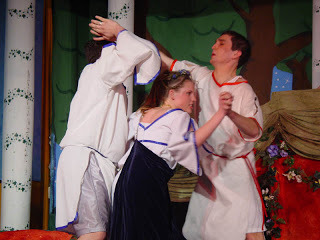 Midsummer Night's Dream: We've also just had our first production meeting for this summer's Shakespeare, A Midsummer Night's Dream. I've actually directed this one already, and it's the Shakespeare that keeps following me around (meaning, every time I turn around, someone's performing it...and I usually go see it). I do think I'm going to be drawing on a lot of my original philosophical ideas, although I'm very excited to see what this new bunch of actors brings to it. I'm also planning to do this in the round! Yippee!
Midsummer Night's Dream: We've also just had our first production meeting for this summer's Shakespeare, A Midsummer Night's Dream. I've actually directed this one already, and it's the Shakespeare that keeps following me around (meaning, every time I turn around, someone's performing it...and I usually go see it). I do think I'm going to be drawing on a lot of my original philosophical ideas, although I'm very excited to see what this new bunch of actors brings to it. I'm also planning to do this in the round! Yippee!
Steadfast Tin Soldier/Against the Odds: This year for the spring and autumn Advanced Musical Theatre courses, we put on the first scene of my TYA Opera, The Steadfast Tin Soldier, and then just a few weeks ago the students put together this really awesome plot for a musical (Against the Odds) using the pastiche form (aka using songs from other musicals and tweaking lyrics as necessary). We'll be starting up two more sessions beginning in January.
Shakespeare Courses/Adjudication: In 2011, I also gave two Shakespeare courses - one on line endings and physicalizing verse at the New England Festival Conference, where the winners of the festival plays all perfom for one another, and the other a four week Shakespeare intensive for adults. I also adjusticated for a high school in southern Massachusetts, for their competitive plays. Oh, I also helped coach an actress for the Shakespeare competitio this year.
Readings: In February and then again in September, I was priviledged to attend the Small Theatre Alliance of Boston's Open Mic nights, for 10-minute excerpt readings. I got to hear a revision of the end of Act II of Cupid and Psyche (and it works!!!), and to hear my ten minute play, Turn to Flesh (which also works!). I'm still revising C&P thanks to the feedback and inspiration from that session, and I've since sent Turn to Flesh out to a few festivals, including the Humana Festival.
New Plays: I did write quite a few new plays this year, including Curses!, No Boys Allowed, Crying Wolf, Heirs & Errors, A Comedy of Murders, Turn to Flesh and To the Dark Tower Came. The last one is a play in some iambic, some rhyming couplets, and some lyrical prose, which follows a man as he walks to his death...and which was one of the final three for the Thornton Wilder Playlet Competition through Playscripts, Inc. Huzzah! I also significantly revised my previously titled, Supermarket Soliloquies to the significantly better Occupy Walmart, which is as close as I've gotten to an Ives-ian play so far.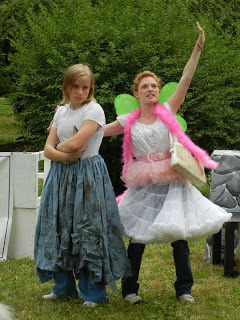 Productions: 2011 was a fairly good year for productions of my published plays, too! The Passion Play was produced through independent contract in Dublin, Ireland. Math for Actors went up in Christchurch, New Zealand, as well as Illinois, Florida, and Ohio. Wallace's Will went up in Georgia, and Charming Princes actually went up several times in New York (for a summer tour - see right), Indiana, Maryland, and Virginia. Hooray! Oh, and One Nation, a short performance piece for Veteran's Day, went up in Leominster, MA.Other Doings:
Productions: 2011 was a fairly good year for productions of my published plays, too! The Passion Play was produced through independent contract in Dublin, Ireland. Math for Actors went up in Christchurch, New Zealand, as well as Illinois, Florida, and Ohio. Wallace's Will went up in Georgia, and Charming Princes actually went up several times in New York (for a summer tour - see right), Indiana, Maryland, and Virginia. Hooray! Oh, and One Nation, a short performance piece for Veteran's Day, went up in Leominster, MA.Other Doings:
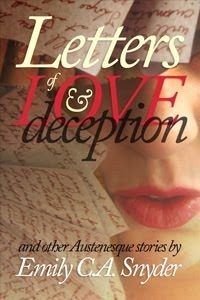 I've also tried really working on taking my job as a novelist more seriously. I was fortunate enough to publish Letters of Love & Deception, and I'm prepping Presumption, as readers of this blog know. I've redone this blog. I've learnt what a guest post is. I got myself a twitter (although I'm still learning about that). I'm keeping up with the House of Strangeways. I loved doing the Teatime Ten...and then found that even I can't do everything all the time always.
I've also tried really working on taking my job as a novelist more seriously. I was fortunate enough to publish Letters of Love & Deception, and I'm prepping Presumption, as readers of this blog know. I've redone this blog. I've learnt what a guest post is. I got myself a twitter (although I'm still learning about that). I'm keeping up with the House of Strangeways. I loved doing the Teatime Ten...and then found that even I can't do everything all the time always.
I've also applied to Columbia's Directing MFA program...although we'll see if I get in. But I'm seriously thinking about just moving to NYC and "doing my time" at last, come this September. (Unless it gets derailed again, like the summer of 2009!) What saddens me most is that if I go, I won't see my nephews as often. (The eldest recenty asked for a "voice lesson" so we went downstairs and sang "Jingle Bells." It was really cute!)
But I've gone this bezerk this year...why not go more bezerk next?
I'd write more, but I've got a party to go to, mes cheres et mesdemoiselles! And this hair ain't gonna curl itself. Have a wonderful and safe New Year! And may you ring out the old with much gladness, and good crazy, too!
I'd say that 2011 was the year I went crazy. Not actually emotional break-downage. (That was 2008-2009, when my personal life and the economy went cablooey in cahoots. Everyone should have a year they actually break down. It makes everything else so much more manageable.)
But rather, 2011 was the year that I artistically bezerked.
Now, I am a bezerker by trade. That is, I waffle and I waffle and I waffle over a life-altering decision...and then, rather than carefully and thoughtfully going step by step, I sort of scream my barbaric "Yawp!" at the world and run at it full-throttle.
That's how I chose a college. That's how I joined household (Catholic sororities). That's how I became a teacher. That's how I became a director. That's how I became an author. And, thanks to the complete lack of jobs in America...that's how in 2011, I became a working artist.
It always starts the same way. I say to myself: "Myself! [What you're about to do] is crazy. No one ever does [that thing]. No one can actually make a living at [that thing]. So I'll do [that thing] for a lark...and see if anyone takes me seriously."
And then they do.
And then I say: "[Expletive.]"
However, what I've learnt from being a working artist is that you had better have a colour-coded calendar. And you had better be able to compartmentalize. Now, I've got the former, and I'm working on the latter. I'm also trying to learn how to juggle - because while I've gotten to the point of beginning to understand how to be a working theatrical director, I'm still learning how to be a working author.
But anywho...these are the things I have done in 2011. And although it drove me nuts, and it meant I had almost no time...I like being busy. And I like doing what I do.
So, thank You, God, for throwing me into these ridiculous opportunities, and please still be there to catch me when it feels like I'm falling apart. Amen.
 Edited to add: And thank you to
Austenesque Reviews
not only for first bringing me into the authorial blogosphere (yes, you can thank
Meredith Esparza
for everything), but also for awarding Nachtsturm Castle "Best Non-Pride and Prejudice Austenesque Sequel" of the year! Yippeeeeeeeee! (
Buy your copy today!
)
Edited to add: And thank you to
Austenesque Reviews
not only for first bringing me into the authorial blogosphere (yes, you can thank
Meredith Esparza
for everything), but also for awarding Nachtsturm Castle "Best Non-Pride and Prejudice Austenesque Sequel" of the year! Yippeeeeeeeee! (
Buy your copy today!
) I started running out of time with all that happened theatrically, but I really want to take a moment to thank those who welcomed me into the on-line author community. Meredith dragged me in for the Austenesque Extravaganza and my first twitter party ever. Then the Indie Jane girls, Maria Grazia , and the Regency Ladies really encouraged me and gave me opportunities - more than I deserve or than I knew. And to Laura McDonald who first gave me the opportunity to publish through the wonderful Girlebooks imprint. Thank you, to all of you.
And bear with me as I try to juggle plays and prose!
Theatre (Directing)
 Tartuffe: A life-long desire to direct this play finally came to pass in 2010-2011 when we first produced the script in its entirety...and then a whirlwind, highly cut down version for the Massachusetts Drama Guild Festival. We were non-competitive last year, in part because we didn't quite know what we were getting into, and in part because we had been working on this play since October 2010...and were ending in March 2011...and that's a long time for high school students to have to see each other in a play. That said, each iteration of Moliere's greatest work became better and better. So that by the time we finally got to Festival, when the Tartuffe actors left the stage, the other actors from other schools at Festival got on their knees and bowed down to my actors. We were told by the judges we wouldn't have gone on anyway, because essentially we were too funny, but what a wonderful critique!
Tartuffe: A life-long desire to direct this play finally came to pass in 2010-2011 when we first produced the script in its entirety...and then a whirlwind, highly cut down version for the Massachusetts Drama Guild Festival. We were non-competitive last year, in part because we didn't quite know what we were getting into, and in part because we had been working on this play since October 2010...and were ending in March 2011...and that's a long time for high school students to have to see each other in a play. That said, each iteration of Moliere's greatest work became better and better. So that by the time we finally got to Festival, when the Tartuffe actors left the stage, the other actors from other schools at Festival got on their knees and bowed down to my actors. We were told by the judges we wouldn't have gone on anyway, because essentially we were too funny, but what a wonderful critique!
Curses!, No Boys Allowed, Crying Wolf: During tech for Little Shop of Horrors (October 2010), I mentioned to Mrs. McKenzie who runs the HHS drama department that it might be a good idea to do an 8th and 9th grade play. No cuts, short rehearsal period - something just for those people who might not otherwise get cast; something to give them experience and bond them together as a group. What we ended up doing were three original fractured fairy tales, which were terribly fun to put on. They're part of my Grimms Aghast series, and it was neat to return to fairy godmother Lilynimble Merryweather...and learn more about her family: her overbearing mother, Queen Morningstar, and her ne'er-do-well brother, Hexmaker Gloamingwand! It was a really wonderful experience, and I'm glad to say that it continued through to this year!
 South Pacific: I wasn't supposed to work on the all-school musical for 2011 (because I was doing Tartuffe & Curses! simultaneously) but Mrs. McKenzie's music director dropped out two weeks before show. So I got called in as a "vocal coach" and taught the ridiculously easy and choral/harmony-free score to some pretty durn talented kids. I also took some promotional photos, which is always fun, and I oversaw the sound design like usual. That show actually had a lot of sound issues, b/c I was running backstage anyway to get a wet mike on Nellie for the *nnnnnngh* hair-washing scene...but for whatever reason the mikes kept shorting out, etc., so I was constantly running back and forth to the different wing, ripping mikes off of high school students when they stepped off the stage for just a second, re-miking them and throwing them back on with none the wiser. A technical ninja if I do say so myself. *plop*
South Pacific: I wasn't supposed to work on the all-school musical for 2011 (because I was doing Tartuffe & Curses! simultaneously) but Mrs. McKenzie's music director dropped out two weeks before show. So I got called in as a "vocal coach" and taught the ridiculously easy and choral/harmony-free score to some pretty durn talented kids. I also took some promotional photos, which is always fun, and I oversaw the sound design like usual. That show actually had a lot of sound issues, b/c I was running backstage anyway to get a wet mike on Nellie for the *nnnnnngh* hair-washing scene...but for whatever reason the mikes kept shorting out, etc., so I was constantly running back and forth to the different wing, ripping mikes off of high school students when they stepped off the stage for just a second, re-miking them and throwing them back on with none the wiser. A technical ninja if I do say so myself. *plop* Heirs & Errors: While I directed those shows, I also directed another original play: this one the first dinner mystery theatre that I'd ever written. It was a really interesting experience, because writing a mystery requires a lot of forethought (of which I typically have little). Thanks to the wonderful cast, however, they not only brought the show to life, but they even allowed me to see places where we could be a little more overt in our clues and consequently emotional with our acting. We also did a lot of cast and audience interaction, which is always fun. Once again, though, we had some technical issues since 1) we had to cancel opening night b/c not enough publicity had been done to get enough audience in (however we ran it anyway for a select few who could only make that night) and 2) it was in an ooooooold building with weird wiring, so sometimes the sound or lights would blow out if we turned them up too high. (Oh the joys of old wiring.) Fortunately, we sorted out the bugs during tech...only to have one of our leads blow out his knee before the last night of performance. He decided to go on anyway, with a cane, and actually used that cane to very good advantage...which made me wish he'd asked for a cane earlier.
Heirs & Errors: While I directed those shows, I also directed another original play: this one the first dinner mystery theatre that I'd ever written. It was a really interesting experience, because writing a mystery requires a lot of forethought (of which I typically have little). Thanks to the wonderful cast, however, they not only brought the show to life, but they even allowed me to see places where we could be a little more overt in our clues and consequently emotional with our acting. We also did a lot of cast and audience interaction, which is always fun. Once again, though, we had some technical issues since 1) we had to cancel opening night b/c not enough publicity had been done to get enough audience in (however we ran it anyway for a select few who could only make that night) and 2) it was in an ooooooold building with weird wiring, so sometimes the sound or lights would blow out if we turned them up too high. (Oh the joys of old wiring.) Fortunately, we sorted out the bugs during tech...only to have one of our leads blow out his knee before the last night of performance. He decided to go on anyway, with a cane, and actually used that cane to very good advantage...which made me wish he'd asked for a cane earlier.

A Comedy of Murders: I'm the sophomore class play director, for HHS competitive plays, and I knew we'd have quite a few people for the year I directed. So I wrote a play with thirteen parts...and then had to add an extra part anyway! I also wrote a show that only needed one male actor...and then I was blessed with two! It was a fun show, full of in-jokes, and at the very end we let our murderer go running through the audience stabbing everyone (yay theatre of cruelty?). We also had an invited dress rehearsal, where we worked out what we would do should an audience member choose to go on-stage. I'd say that, although I've certainly worked since with audience interaction, A Comedy of Murders, is sort of the ending-place for the moment of really exploring what you can and can't get the audience to do. It's fascinating: the audience will play along, but refuses to destroy a show. Even when invited. You can watch the whole thing (single angle) below:
 As You Like It: I've wanted to do this show since 2000, and this year I had my chance. We had a great Rosalind, and she had a wonderful cast, and we had one of our more ornate sets...which took up a lot of time painting, and which also took up a lot of time putting back in Holliston...in the rain...without raincoats...up a muddy hill...with only a few of the cast and crew. That wasn't so fun. I also got to play with gobos, which was neat. I'll admit, this is a show that I think I'm going to come back to a lot. It's a rich play, and I'm still processing it. One of the things I really liked, though, was how the script was rearranged so that we kept a through-line from Act I's politics into the woods. It was also fun "Killing Kayleigh Kenny" (aka Jacques LeBeau - see right). And showing Oliver and Orlando fighting one another! And Touchstone's puppets. And the improv about the good china that Celia and Rosalind had.
As You Like It: I've wanted to do this show since 2000, and this year I had my chance. We had a great Rosalind, and she had a wonderful cast, and we had one of our more ornate sets...which took up a lot of time painting, and which also took up a lot of time putting back in Holliston...in the rain...without raincoats...up a muddy hill...with only a few of the cast and crew. That wasn't so fun. I also got to play with gobos, which was neat. I'll admit, this is a show that I think I'm going to come back to a lot. It's a rich play, and I'm still processing it. One of the things I really liked, though, was how the script was rearranged so that we kept a through-line from Act I's politics into the woods. It was also fun "Killing Kayleigh Kenny" (aka Jacques LeBeau - see right). And showing Oliver and Orlando fighting one another! And Touchstone's puppets. And the improv about the good china that Celia and Rosalind had. The Tempest: I've posted quite a bit about this play...but there are two things that really make me proud of it: 1) that although the cast and crew were both huge...and of equal number, there were no cliques, but a true feeling of ensemble and 2) that because of that, everyone made this experience and this show luminous to work on. We had a ton of improv rehearsals to get into the backstory...especially of the nobles. We had live music, composed just for the show, which was gorgeous to listen to, and ended up being the life and blood of our piece. We had amazing costumes, hair/make-up, and a brilliant set, wonderful lighting and sound design, and just fantastic stage managers and crew. Everything just came together. Except, of course, for when our Prospero jumped into the couch at an early rehearsal and had to go to the hospital (argh)...and then couldn't make opening night...and I went on (with script) to play Prospero. (I'll write about that another time.) And then our Stephano got sick for closing night...and I asked a crew member to go on! Regardless, it was a beautiful play and I'd love to revisit it. Theatre (Beginning, Teaching, Writing)
The Tempest: I've posted quite a bit about this play...but there are two things that really make me proud of it: 1) that although the cast and crew were both huge...and of equal number, there were no cliques, but a true feeling of ensemble and 2) that because of that, everyone made this experience and this show luminous to work on. We had a ton of improv rehearsals to get into the backstory...especially of the nobles. We had live music, composed just for the show, which was gorgeous to listen to, and ended up being the life and blood of our piece. We had amazing costumes, hair/make-up, and a brilliant set, wonderful lighting and sound design, and just fantastic stage managers and crew. Everything just came together. Except, of course, for when our Prospero jumped into the couch at an early rehearsal and had to go to the hospital (argh)...and then couldn't make opening night...and I went on (with script) to play Prospero. (I'll write about that another time.) And then our Stephano got sick for closing night...and I asked a crew member to go on! Regardless, it was a beautiful play and I'd love to revisit it. Theatre (Beginning, Teaching, Writing)The Light Princess/Macbeth: I'm about to start two shows that I've just cast, my adaptation of The Light Princess by George MacDonald, and Shakespeare's Macbeth. I'm psyched about both for a few reasons. The Light Princess is very Theatre for Young Audiences (TYA), which means that we've got a cast of six (and three floaters - think Noh Drama), we're going to be using puppets, and backlighting, and throwing toilet-paper over the audience, and blowing bubbles, and all sorts of fun stuff to create a world wherein princess both fly and float. On the other supernatural end of things, I'm also doing Macbeth which is one of Shakespeare's Big Four (Hamlet, Midsummer's, Romeo & Juliet, Macbeth). It's also the only one of the big for I haven't directed yet. I've teched it twice (lights both times, actually), but this'll be the first time directing it. I'm psyched to delve into this play less as a war story and more as a story of the death of children and the betrayal of trust. It's an inimate tale of murder, revenge...and yes, hopefully, a glimmer of redemption. Even if that redemption's lost. We also have a super cast going in (still looking for a few good men, though!) and so I'm super excited to see what happens!
 Midsummer Night's Dream: We've also just had our first production meeting for this summer's Shakespeare, A Midsummer Night's Dream. I've actually directed this one already, and it's the Shakespeare that keeps following me around (meaning, every time I turn around, someone's performing it...and I usually go see it). I do think I'm going to be drawing on a lot of my original philosophical ideas, although I'm very excited to see what this new bunch of actors brings to it. I'm also planning to do this in the round! Yippee!
Midsummer Night's Dream: We've also just had our first production meeting for this summer's Shakespeare, A Midsummer Night's Dream. I've actually directed this one already, and it's the Shakespeare that keeps following me around (meaning, every time I turn around, someone's performing it...and I usually go see it). I do think I'm going to be drawing on a lot of my original philosophical ideas, although I'm very excited to see what this new bunch of actors brings to it. I'm also planning to do this in the round! Yippee!Steadfast Tin Soldier/Against the Odds: This year for the spring and autumn Advanced Musical Theatre courses, we put on the first scene of my TYA Opera, The Steadfast Tin Soldier, and then just a few weeks ago the students put together this really awesome plot for a musical (Against the Odds) using the pastiche form (aka using songs from other musicals and tweaking lyrics as necessary). We'll be starting up two more sessions beginning in January.
Shakespeare Courses/Adjudication: In 2011, I also gave two Shakespeare courses - one on line endings and physicalizing verse at the New England Festival Conference, where the winners of the festival plays all perfom for one another, and the other a four week Shakespeare intensive for adults. I also adjusticated for a high school in southern Massachusetts, for their competitive plays. Oh, I also helped coach an actress for the Shakespeare competitio this year.
Readings: In February and then again in September, I was priviledged to attend the Small Theatre Alliance of Boston's Open Mic nights, for 10-minute excerpt readings. I got to hear a revision of the end of Act II of Cupid and Psyche (and it works!!!), and to hear my ten minute play, Turn to Flesh (which also works!). I'm still revising C&P thanks to the feedback and inspiration from that session, and I've since sent Turn to Flesh out to a few festivals, including the Humana Festival.
New Plays: I did write quite a few new plays this year, including Curses!, No Boys Allowed, Crying Wolf, Heirs & Errors, A Comedy of Murders, Turn to Flesh and To the Dark Tower Came. The last one is a play in some iambic, some rhyming couplets, and some lyrical prose, which follows a man as he walks to his death...and which was one of the final three for the Thornton Wilder Playlet Competition through Playscripts, Inc. Huzzah! I also significantly revised my previously titled, Supermarket Soliloquies to the significantly better Occupy Walmart, which is as close as I've gotten to an Ives-ian play so far.
 Productions: 2011 was a fairly good year for productions of my published plays, too! The Passion Play was produced through independent contract in Dublin, Ireland. Math for Actors went up in Christchurch, New Zealand, as well as Illinois, Florida, and Ohio. Wallace's Will went up in Georgia, and Charming Princes actually went up several times in New York (for a summer tour - see right), Indiana, Maryland, and Virginia. Hooray! Oh, and One Nation, a short performance piece for Veteran's Day, went up in Leominster, MA.Other Doings:
Productions: 2011 was a fairly good year for productions of my published plays, too! The Passion Play was produced through independent contract in Dublin, Ireland. Math for Actors went up in Christchurch, New Zealand, as well as Illinois, Florida, and Ohio. Wallace's Will went up in Georgia, and Charming Princes actually went up several times in New York (for a summer tour - see right), Indiana, Maryland, and Virginia. Hooray! Oh, and One Nation, a short performance piece for Veteran's Day, went up in Leominster, MA.Other Doings: I've also tried really working on taking my job as a novelist more seriously. I was fortunate enough to publish Letters of Love & Deception, and I'm prepping Presumption, as readers of this blog know. I've redone this blog. I've learnt what a guest post is. I got myself a twitter (although I'm still learning about that). I'm keeping up with the House of Strangeways. I loved doing the Teatime Ten...and then found that even I can't do everything all the time always.
I've also tried really working on taking my job as a novelist more seriously. I was fortunate enough to publish Letters of Love & Deception, and I'm prepping Presumption, as readers of this blog know. I've redone this blog. I've learnt what a guest post is. I got myself a twitter (although I'm still learning about that). I'm keeping up with the House of Strangeways. I loved doing the Teatime Ten...and then found that even I can't do everything all the time always.I've also applied to Columbia's Directing MFA program...although we'll see if I get in. But I'm seriously thinking about just moving to NYC and "doing my time" at last, come this September. (Unless it gets derailed again, like the summer of 2009!) What saddens me most is that if I go, I won't see my nephews as often. (The eldest recenty asked for a "voice lesson" so we went downstairs and sang "Jingle Bells." It was really cute!)
But I've gone this bezerk this year...why not go more bezerk next?
I'd write more, but I've got a party to go to, mes cheres et mesdemoiselles! And this hair ain't gonna curl itself. Have a wonderful and safe New Year! And may you ring out the old with much gladness, and good crazy, too!
Published on December 31, 2011 17:58
Free Friday Fitzwilliam
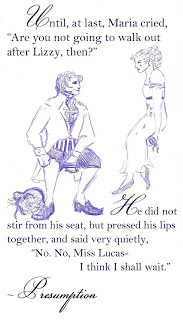 For those of you looking for your House of Strangeways kick...
For those of you looking for your House of Strangeways kick...Never fear! It's en route. There was a slight hiccup in my personal life, but in the nonce, you can catch up on all the fun here !
So, swinging in for the rescue is Colonel Fitzwilliam from the forthcoming Presumption. (You can read the first six chapters of the novel here available until January 16th!)
See you back here very soon!
Published on December 31, 2011 10:37

